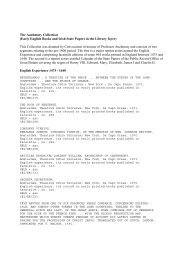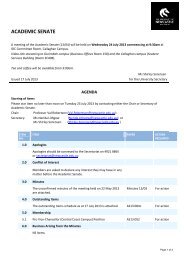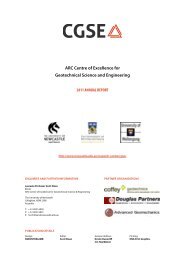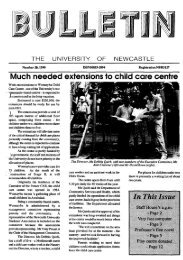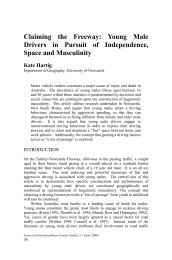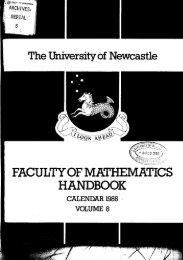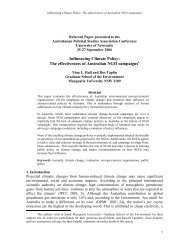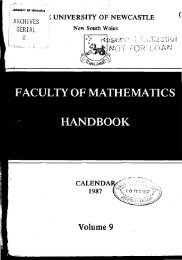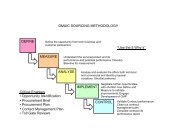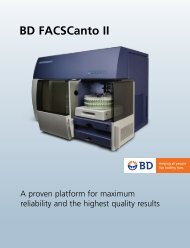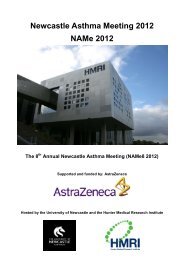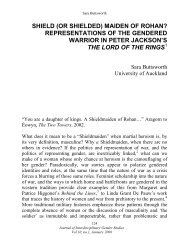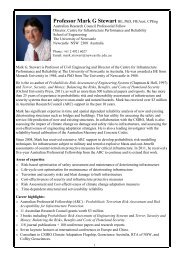n - University of Newcastle
n - University of Newcastle
n - University of Newcastle
You also want an ePaper? Increase the reach of your titles
YUMPU automatically turns print PDFs into web optimized ePapers that Google loves.
The interrogatives seem to be the connectkw link between the<br />
nouns ancl the verbs. This arises from the fact that they take<br />
both the noun ancl the verbal suffixes. For instance, while inji<br />
' \\-hen ' S takes, at times, the forms inj i-go ancl inj i-gal, it also<br />
becomes inj i-gun ailcl in j i-gun-ga, ancl these last terminations<br />
are verbal suEses. The morcl miny ug ' what ' ? may also take<br />
such forn1s as these:--minyu~allela? 'what nre you cloing'?<br />
minyu&en? 'what is the matter'? miny~~goro? ' what isdone'!<br />
In fornl, there is really no clistinction between intei-rogative and<br />
assertive sentences ; hence any ii1terrogati1-e may have also an<br />
assertire meaning ; miny ukallela gai, therefore, may mean ' I<br />
an1 cloing something.' In this dialect, there is a grammatical<br />
clistinction between the imperative, the affirmati\-e, ancl the negative<br />
forms <strong>of</strong> speech; but all these forms may be made interrogatire<br />
by the tone <strong>of</strong> the voice.<br />
S~cflx-2>out~1ositio1zs zlsecl zcitl~ L f i ~ ~ and q ~ P,.onou~2s.<br />
~<br />
It m y be as well to ask, at this stage, if there are any prc-<br />
positions in ISSin y u &. There is a large number <strong>of</strong> words clenoting<br />
place ; most <strong>of</strong> them are simplc adverbs, and some <strong>of</strong> them clemon-<br />
stratives, and some occasioilally have such a 'elationship to the<br />
noun that they call only be regarcled as folfilling the <strong>of</strong>fice <strong>of</strong><br />
pre1)ositions. They are not always placed before the noun, the<br />
&Sinjug having the greatest freedom with respect to the collo-<br />
cation <strong>of</strong> ~5-orcls. The morcl kam, which is among the demon-<br />
strntives, may also be regarded at times as a preposition. When<br />
a native says malo ]ram kubbil ky us, which is, literz~lly, ' you<br />
to scmb go,' why shoulcl not lcam be callecl a preposition? In<br />
the same way, kagga kubbil means 'out to the scrub.'<br />
There are a few words <strong>of</strong> this kind that have s limited Llflec-<br />
tion; e.y., balli 07. ballia means 'uncler'; juy,Jua, junno are<br />
'do~vn,' 'into'; bundagil, bunclagally, bunditgalla, 'near.' Of<br />
these, the particular form used is that which agrees in telmination<br />
with the noun qualified.<br />
Every word in BIinyug ends either wit11 a vowel or a liquid,<br />
ailel there are certain euphonic rules to be followecl in connecting<br />
the suffixes with each kind <strong>of</strong> encling. I11 the following tables<br />
examples will be given <strong>of</strong> each kincl. In Table I., all the inflecting<br />
suffixes will be joinecl to mully. In Table 11. mill be found the<br />
singular persolla1 pronouns, 31-hich contain some irregularities,<br />
ancl a life-noun ending in I, 911, n, ng, ra, or o. It will, homerel;<br />
be unnecessary to give in full the declension <strong>of</strong> these.<br />
I11 Table III., four non-life nouns are chosen, ending in -I, -18,<br />
-in, ancl -xi, and the teinlinations giren are those numberecl I, 8,9,<br />
From these examples, all other forms can he understood.<br />
TIIE MIXTUSG DIALECT.



